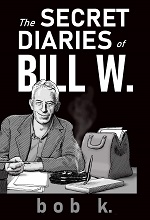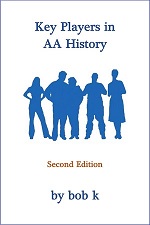This post was originally published on this site
By bob k.
In school, I did well on writing assignments and exams that were of an essay-format. Later, I did some fantasizing about becoming a writer. In those long-gone days, every few weeks, Johnny Carson would bring on an author for the last 7 minutes of his late night talk show. In my area, that would take place close to one am and in my intoxicated state, I’d imagine exchanging witty banter with Johnny. That did not lead to anything getting written. In many areas, I’ve been more of a dreamer than a doer.
Twenty years ago, my friend Agnostic Gord became the editor of the Toronto Intergroup newsletter. I penned some columns and enjoyed the entire process. For a person prone to low self-esteem, it was gratifying to see my work in print under the byline “Sunglasses Bob K.” In retrospect, it was surely a far bigger deal to me than to anyone else.
In 2011, I wrote a screed opposing the use of “The Lord’s Prayer” in AA meetings and submitted it to The Grapevine. The letter of rejection was lovely. I imagined the GSO folks tossing my labor into the wastebasket while assuring me that my essay would be kept “on file.” That event occurred right around the time that Toronto Intergroup had booted out two groups that described themselves as “agnostic.” That event led to the creation of the AAAgnostica.org website.
 I thought: “These heathens will love my Lord’s Prayer rant” and I posted it as a comment on one of the Agnostica articles. I have to say that, over the years, there have been a few people who regularly wrote 2,000 word comments on 1,500 word Agnostica essays. That’s pretty dumb—when someone ELSE does it. I became a frequent contributor to the website and my submissions on AA’s origins led to the publication of Key Players in AA History in 2015.
I thought: “These heathens will love my Lord’s Prayer rant” and I posted it as a comment on one of the Agnostica articles. I have to say that, over the years, there have been a few people who regularly wrote 2,000 word comments on 1,500 word Agnostica essays. That’s pretty dumb—when someone ELSE does it. I became a frequent contributor to the website and my submissions on AA’s origins led to the publication of Key Players in AA History in 2015.
Many people who’ve written nothing previously sit down to write a book. That’s really hard to do, I expect. I found myself having written half of a book, almost by accident, as I rattled off 2,000 word essays.

My second book, The Secret Diaries of Bill W., is biographical (or historical) fiction. Once more, I was taking the easier route as my story of AA’s founder followed a timeline of real events. I created dialogue and some inner thoughts of Bill’s but I had an existing framework upon which to hang my imaginings of what might have happened. Fiction writers, so they tell us, often draw on real-life experiences and then jazz them up a bit. Possibly more than a bit.
My latest effort Daily Reflections for Modern Twelve Step Recovery came to Amazon on January 1st—only a few short days ago.

In essence, this also is a book of essays. There was no single target of writing a 370 page volume—rather several (366) smaller projects of 350-400 words each. As was the case with Key Players, research played as great a role as writing. The internet has thousands of inspirational quotes. Find one you like, contribute some analysis, and there’s a page. Rinse and repeat. Other reflections are based on quotations from my many books on AA. I have most of the history books and almost all of the recent efforts that secularize the 12-step process.
In December of 2023, I had spotted a Facebook comment asking if there were other secular reflections books like Joe C.’s marvellous Beyond Belief: Agnostic Musings for 12 Step Life (2013) I thought: “That would be an interesting project” and got underway last January. By the end of March a first draft was 90% complete. At times, my rate of production was furious. I follow the general philosophy of: “Get it on paper and schmooze it later.” I was reporting nightly for a while to my good friend Charles. Some days, I cranked out 7, 8, or 9 reflections—2 to 3 thousand words per day. Accountability is helpful. Reporting to my friend kept the hectic pace going and staved off a possible burnout.
To be clear, someone with full-time employment, a real job so-to-speak, or kids, could not match that pace. Life gets in the way. My seasonal business made my spring and summer dedication to finishing the book somewhat erratic.
The tedious part of the undertaking is the seemingly endless proofreading and editing that follows. I even enjoy that aspect of the process, except on the days that I don’t.
Daily Reflections for Modern Twelve Step Recovery
Let’s allow the book to explain itself a bit.
We have this from the back cover: Modern 12 Step recovery, and spirituality in general, is vastly different from what was encountered at the time AA was emerging from its evangelical Christian roots. Members in the current era often do not believe in God or are agnostic. Spirituality comes in shapes and sizes unimaginable in the America of the 1930s. You’ll find the reflections in this book to be psychological rather than religious.
Next we have the Amazon blurb reads as follows: The thinly veiled Christianity of Richmond Walker’s “24 Hours In A Day” book was more palatable in 1955 and 1965 than it is in 2025. Many people in 12-Step recovery groups are ready for a different sort of daily reader – one stressing the psychological rather than the magical. “Daily Reflections for Modern 12-Step Recovery” draws from diverse sources. We travel back many centuries to glean wisdom from Daoists, Buddhists, Stoics, and Greek philosophers. From the very recent era of self-publishing, you’ll find excerpts from books that tailor 12-Step recovery to specific demographics – women, secularists, non-egomaniacs and others. In between the ancient insights and the new, we find wise words from philosophers, presidents, activists, inventors, sports icons and entertainers. We look at the science of addiction and provide some snippets of recovey history. This volume is not your father’s Oldsmobile. It’s a modern and practical guide to having a better life in recovery and definitely is secularist-friendly.
I particularly liked that my daily reader addresses core issues. In doing that, it is newcomer-friendly. Here are a few of the Quotes of the Day in that vein.
January 2 The victim is caught in an increasingly vicious circle. Drunkenness, acute nervous hangover, remorse, feelings of inferiority; then drunkenness again. A sanitarium may temporarily check the outward expression of this state of mind, but the inner urge continues to exist. – The Common Sense of Drinking, Richard Peabody 1892-1936 p. 7
January 29 Moderation!! A drink of liquor is to my appetite what a red-hot coal of fire is to a keg of dry powder. You can as easily shoot a ball from a cannon’s mouth moderately, or fire off a magazine slowly, as I can drink liquor moderately. When I take one drink, if it is but a taste, I must have more, if I knew hell would burst out of the earth and engulf me the next instant. I am either perfectly sober, with no smell of liquor about me, or I am very drunk. – Fifteen Years in Hell (1885), Luther Benson 1844-1898, p. 85
February 15 Proposition: “You like having resentments.” Why? Because they serve a purpose. What does a resentment do for you? – Glenn Rader, author of Modern 12 Step Recovery
July 17 The “need for others” is the most famous facet of Alcoholics Anonymous. Those outside of AA often regard it condescendingly, interpreting it away as “the substitution of a social dependence for a drug dependence” (Stanton Peale); or as “accepting the emotional immaturity of alcoholics and supplying a crutch for it.” (Francis Chambers) – Shame & Guilt, Ernest Kurtz, p. 34
December 27 You don’t get over an addiction by stopping using. You recover by creating a new life where it is easier to not use. If you don’t create a new life, then all the factors that brought you to your addiction will catch up with you again. – Anonymous
We have multiple reminders to be more kind, more grateful, more positive, and more appreciative. I love William Butler Yeats’ wise words: “The world is full of magic things, patiently waiting for our senses to grow sharper.” More than once we are urged to let go of things like perfectionism, bitterness, and our efforts to control other people. These are fine ideas that we are prone to forget. A daily reader supplies us with gentle admonitions to take the action that will lead to greater peace of mind. Having one that’s God-free is certain to appeal to the readers of this website.
To return briefly to the subject of writing, here’s a thought: “If you want to be a writer, you need to start writing.” That’s much akin to the AA oldtimer axiom that if you want to stop drinking, you’ve got to stop drinking. It’s remarkable how difficult that can be. Here’s a psychiatrist and addiction specialist on that subject:
January 3 Addiction is a terrifying breakdown of reason. People struggling with addiction say they want to stop, but, even with the obliterated nasal passages, scarred livers, overdoses, court cases, lost jobs, and lost families, they are confused, incredulous, and, above all, afraid. They are afraid because they cannot seem to change despite the fact that they so often watch themselves, clear-eyed, do the things they don’t want to do. – The Urge, Carl Erik Fisher, pp. 4-5
AAAgnostica.org has now published three bob k books. “Key Players in AA History,” now in an expanded Second Edition, continues to sell well (for a special-interest volume). “Secret Diaries” has been less successful but was a fun and challenging creative project. The new book “Daily Reflections for Modern Twelve Step Life” is available on Amazon. The price has been discounted for the month of January.
For a PDF of today’s article, click here: Daily Reflections and the Writing Process.
The post Daily Reflections and the Writing Process first appeared on AA Agnostica.
